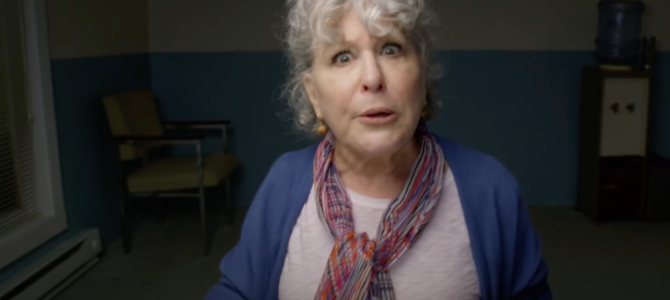HBO’s “Coastal Elites” is conceptually a clever, barebones pandemic-era production. The film is a string of vignettes featuring a single actor and a camera, speaking to a wordless person off-screen. Daniel Levy’s turn, for instance, is a shot of him chatting with a virtual therapist. The script is something that would work well on a stage, but requires fantastic acting to pull off.
Of all the talent the politically charged film features, it’s Bette Middler who gives the best performance. That’s interesting because Middler is exactly the kind of person “Coastal Elites” wants to satirize—hysterically anti-Trump New York Times subscribers whose brains cease to function properly upon sight of a MAGA hat. Middler’s character is a haughty NPR-tote bag New Yorker, the widow of a gym teacher with whom she used to spend Sundays in bed reading the Paper of Record. She’s apoplectic over Trump, but understands how she fits the stereotype.
What she does not understand, however, is why the stereotype is an issue. This a problem for the entire film, which ultimately fails for that very reason.
Middler manages better than her co-stars to command the screen alone, probably at least in part because she had better material with which to work. Perhaps because Trump also appears to have broken her, if Twitter is any indication. “Coastal Elites” tries to add nuance to an increasingly reviled demographic, weaving Middler’s personal struggles into her politics, depicting her as a well-meaning middle-class widow, not an ill-educated multi-millionaire.
But she’s still an elitist, and the movie purposefully emphasizes that she’s justified in her elitism. Where “Coastal Elites” tries to add dimension to “coastal elites,” depicting them as natives of flyover country, and lovers of their pro-Trump family members, it intentionally fails to critique elitism.
Instead, the message is that, yes, the NPR tote bag stereotype is true and funny, but listening to NPR actually makes people better. Yes, virulently anti-Trump coasties have lost tolerance for their pro-Trump family members, but those family members are dumb. The stereotypes are right, but they’re not wrong.
The self-awareness is interesting, and occasionally funny, although “Coastal Elites” drags hard at times due to its format. In the end, what could have been a rare, genuine, constructive satirization of coastal elitism turned into an endorsement of it. That result, unfortunately, is telling.









